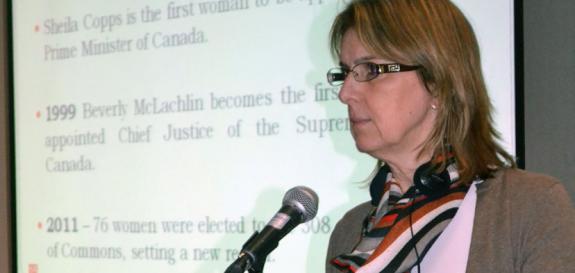COPE-SEPB delegates’ workshop time was spent working discussing women in politics and proposing solutions and incentives to encourage greater participation from women in their unions and public life.
Above – MoveUP Union Representative Barbara Junker talked about her experiences running in the Port Moody civic election
Delegates first spent some time identifying barriers that keep women from running for public life in the same numbers that men do. Some of the barriers mentioned were the fact that women  on average still spend more time on child care and housework than do men, that women miss out on many of the mentorship and training opportunities that many men have, they worry about of the impact to their families of the time commitment and that they aren’t recruited as leaders as often as are men.
on average still spend more time on child care and housework than do men, that women miss out on many of the mentorship and training opportunities that many men have, they worry about of the impact to their families of the time commitment and that they aren’t recruited as leaders as often as are men.
The delegates then broke out into groups and workshopped possible solutions and strategies to mitigate the unique challenges that face women who seek public life. When the groups reported back there were several commonalities: supportive employers who allow for time off,  leaders who step forward as mentors, wider access of quality affordable child care, instilling a sense of self-confidence and leadership in young women, focussed fundraising efforts, and stalwart spouses and partners who share equally the work and responsibilities at home.
leaders who step forward as mentors, wider access of quality affordable child care, instilling a sense of self-confidence and leadership in young women, focussed fundraising efforts, and stalwart spouses and partners who share equally the work and responsibilities at home.
From Equal Voice – a multipartisan group dedicated to electing more women in Canadian politics:
Canada is falling behind in women’s representation.
Canada has just elected 76 women in Parliament – 24.6% of MPs – and ranks 40th in the world on Inter-Parliamentary Union, "List of Women in National Parliaments." This represents a historic record high of women Members of Parliament in the House of Commons! However, despite enjoying economic  prosperity and political stability, Canada has fewer women in parliament than most of Europe and many other countries in the world.
prosperity and political stability, Canada has fewer women in parliament than most of Europe and many other countries in the world.
Women still encounter barriers when seeking elected office:
Stereotyping and perceptions of women’s roles and abilities; few women role models; media imbalances in the treatment of women politicians, family commitments; masculine political environment, failure of political parties to bolster women candidates, finances and exclusion from informal party networks.
Focus on the issue in other countries has delivered results:
Wales recently became the first jurisdiction to elect 50% women, ahead of Sweden (47%) and other Nordic countries which have long been best at electing women. Recently Rwanda topped them, however, and became the nation with the most elected women at 56.30% per cent.




